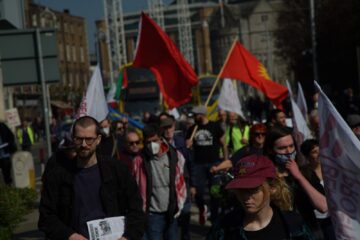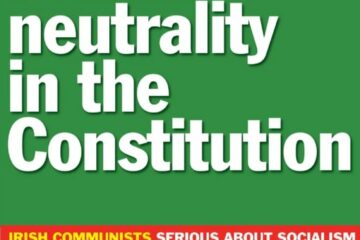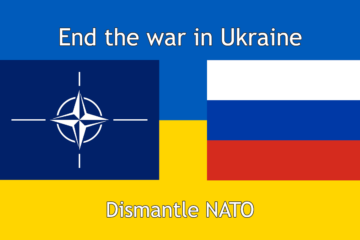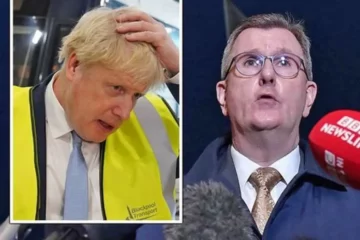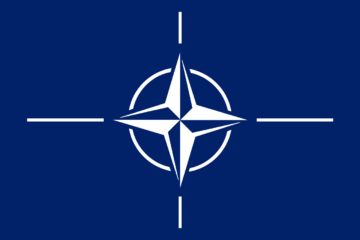30 August 2011
The National Executive Committee of the Communist Party of Ireland at its regular meeting discussed the present political and economic situation in the country, evaluating the effects of the deepening crisis of monopoly capitalism and its increasing impact on working people, north and south.
In the South the coalition Government led by Fine Gael continues with the same failed policies as the previous coalition led by Fianna Fáil, policies they willingly co-operated with, which reflect their own immediate class interests and those of their alliance with European monopoly capital, as expressed through the European Union. They continue to pursue the policy of making working people pay for the massive corporate debt that the state took responsibility for at the behest of the EU, in particular under pressure from German and French monopoly capital.
The crisis in the EU is centred on the euro and the permanent structural debt relationship that has been imposed by the dominant central powers on the countries of the periphery. This is resulting in a massive transfer of wealth from the periphery, in particular from Irish workers.
The crisis, which first emerged in the periphery, is now beginning to be experienced at the centre of the EU itself. This crisis is providing an opportunity for those forces within the institutions of the EU, the Commission and the European Central Bank and within member-states that wish to deepen the EU’s control over national budgetary strategies and fiscal policies. These are policies that will strengthen the economic and political power of German monopoly capitalism and weaken substantially the people’s ability to effect political and economic change at the national level.
Workers, together with their families and the growing ranks of the unemployed, continue to bear the brunt of the savage cuts both in public spending and in their terms and conditions. Education and social welfare (both under the control of Labour Party ministers) will come under increased attack, though the continued resistance of local communities to hospital closures and the withdrawal of school-bus services show that our people are willing and able to resist.
The attacks on joint labour committees and the renewed assault on registered employment agreements, together with the very weak response from the ICTU, can only encourage further attacks on workers and thereby further undermine workers’ rights and the morale of organised labour.
Leading trade union elements appear to be unwilling or unable to mount any political or industrial challenge to these attacks. The leadership of a number of unions have shown courage and leadership on this issue, but they need the support and solidarity of others. It is through united, determined struggle that workers can recover lost rights and can advance. It is clear now that the trade union movement must become either radical or redundant.
What is also increasingly clear is that many leading elements of the trade union movement are all too willing to wait and hope that the Labour Party in government will protect them from further attack. They wish to turn their face away and ignore the fact that the Labour Party leadership are willing and active collaborators in these attacks on working people.
In the North the straitjacket of the fiscal policies and budgetary control asserted by the British government is resulting in further cuts and growing attacks on the public sector. Plans are being developed to make unprecedented cuts in health services, which, if allowed, will lead to the closure of hospitals and other services.
The CPI calls on workers throughout Northern Ireland to support the action by trade unions planned for later this year to defend jobs, pensions, and services. This is an example that trade unions in the South could follow.
The Democratic Unionist Party, the Ulster Unionist Party and the SDLP are enthusiastic supporters of the cuts and are willing collaborators in this process. Sinn Féin, while expressing opposition to the cuts, appears to be unable to articulate any serious alternative that has the potential to win allies within the Protestant section of the working class. It is trapped by its lack of an alternative to the dominant economic and political system; nor will the reduction in corporation tax deliver the jobs that its supporters, including Sinn Féin, claim.
At this time it is important that all those affected by the policies being imposed by the British government attempt to find and build common cause and solidarity to force a change of direction.
The crisis has exposed the deep underlying dependence of both the Northern and the Southern economy to external fiscal and economic controls, which are major obstacles to building a sustainable, people-centred economy and progressive social development and to getting the hundreds of thousands back to work and stemming the tide of immigration.
The building of an all-Ireland economic and political strategy that includes democratic control of economic and fiscal powers, the public ownership of natural resources, repudiation of the debt and breaking the connection with the euro are central areas of struggle for all workers, a strategy that also needs the solidarity of workers in Britain.



